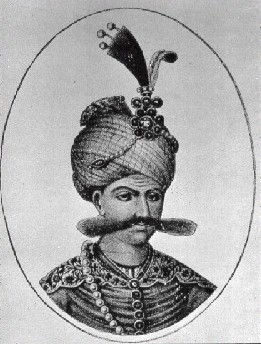 |
| Shah Isma'il al-Safavi, 1499-1524 |
| A.9. | Selim I (1512-1520) | |||
| and the rise of the Safavids: |
Bayezid’s son, Selim, advocated a forceful policy against the Qizilbash while Bayezid maintained a peaceful one; rivalry broke out between his sons while Bayezid was sick and aging. Selim won over the Janissaries, arrived in Istanbul and deposed his father in April 1512. Selim I (1512-20) was known as ‘Yavuz’, ‘the Grim’, and was an energetic conqueror in the style of his ancestors Bayezid I and Mehmed II. He held the empire in an iron grip, and even ruled directly without a Grand Vizier for a short while; the first two years of his reign were spent eliminating all members of the Ottoman dynasty who laid any claim to throne.
He hunted down and killed the partisans, envoys and agents of Shah Isma’il (1499-1524) in Anatolia (which amounted to some 40,000) and proclaimed an expedition against Isma’il in 1514, in his capacity as ghazi against heretics who were corrupting Islam.
 |
| Shah Isma'il al-Safavi, 1499-1524 |
Their armies met at Chaldiran in August; Selim was victorious and
made a ceremonial entry into Tabriz where the khutba was
read in his name. He rounded up merchants, artists and notables
from Khurasan whom Isma’il had forcibly settled in Tabriz
and despatched them to Istanbul. Eastern Anatolia was now finally
annexed to the Ottoman empire: Diyarbakr was occupied in October
1515 and the remaining cities from 1515-17. The Ottomans
organised the Turcoman and Kurdish tribes of this area into
‘peoples’ (the Turcomans became the ‘Grey
People’ or ‘Boz Ulus’, and the Kurds the
‘Black People’ or ‘Kara Ulus’); the Kurds
were mostly Sunnis while the Turcomans were mostly Shi’i,
and began to migrate to Persia where they formed the main force
of the Safavid dynasty. This was also an important conquest
economically since the Ottomans acquired control of the
Tabriz-Aleppo and Tabriz-Bursa silk roads: in 1528 the revenue of
the province of Diyarbakr amounted to 25 million silver aspers
which was an eighth of the entire revenue of the Balkans (55 aspers
= 1 gold piece).